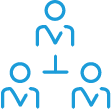Risk appetite
Risk






The risk appetite in the PZU Group has been defined as the magnitude of risk undertaken to attain its business objectives, where its measure is the level of potential financial losses, the decline in asset value or the growth in the amount of liabilities within one year.
Risk appetite defines the maximum level of permissible risk while setting limits and restrictions for the various partial risks and the level above which remedial actions are taken to curtail further risk expansion.
The process of determining the risk appetite and risk limits for each risk category consistent with the Group’s process has been implemented in all the insurance companies in the PZU Group. The management board of each company determines the risk appetite, risk profile and tolerance limits reflecting its strategic plans and the objectives of the entire PZU Group. This approach ensures the adequacy and effectiveness of the risk management system in the PZU Group and prevents the acceptance of risk levels that could jeopardize the financial stability of individual companies or the entire PZU Group. The determination of the appropriate level of risk in each company is the Management Board’s responsibility, whereas a review of the risk appetite values is conducted once a year by the unit responsible for risk, with all actions being coordinated at the PZU Group level.
Risk appetite is determined on an annual basis also in the PZU Group’s banking sector entities. This process is carried out based on the applicable regulatory requirements (including those arising from remedial plans) and good practices. This process is tailored for both banks, taking into consideration the nature and the business and capital structures of both these entities. Risk appetite in banking entities is a topic for consultation with the PZU Group’s parent company and the subject matter of opinions issued by the PZU Group Risk Committee with a view to ensuring consistency between the activities carried out by the banks and the strategic plans and objectives of the PZU Group as a whole as well as ensuring the effectiveness of the risk management system at the Group level. Once agreed, the level of risk appetite is then approved by the banking entities’ supervisory boards.
